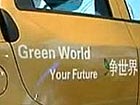| Videos | ? Latest |
|
? Feature | ? Sports | ? Your Videos |
China's new energy roadmap to 2020

China's setting down the gauntlet for going green on the roads. It's aiming for annual sales of 1 million units of new-energy cars, by 2015. Under the country's latest plan for the auto industry, to be rolled out at the end of 2010, new energy vehicles will be the top priority. CCTV reporter discovers how domestic and foreign auto-makers are rising to the challenge.
The spotlight is beaming down, on China's new-energy car sector.
The world's largest auto market is set to promote the use of 20,000 new energy vehicles for public transport, by the end of this year. And by 2015, China aims to sell over 1 million new energy vehicles a year. And the target is pitched at 100 million by 2020.
As of October this year, the country had earmarked 970 million yuan to subsidize new energy vehicles.
And domestic and foreign auto-makers are already rising to the challenge.
Xavier Peugeot, global director of Marketing & Communications, Peugeot, said, "We also want to demonstrate that electric cars can be seen in a different way, connected to performance...and I would say high performance."
Dai Bingcheng, CEO of Zhongwen Yixing Electric Auto Co, said, "The electric bus sector has become more commercialized, and expanded faster than electric cars. And the electric bus development has attracted more focus from the government, so we believe it's a mature industry."
But consumers aren't yet convinced. Some say they still prefer traditional energy vehicles.
An Auto consumer said, "The current electric car market is not mature enough. I'm concerned about the costs of using it and the convenience of car maintenance. So right now I will not consider buying it."
An auto consumer said, "I will not buy an electric car because I'm worried the battery won't last long enough."
To address these concerns, the Chinese government seems to be armed with all the answers.
Wan Gang, Minister of Science & Technology, said, "In order to improve the current electric car standard system, the Ministry of Science and Technology will work with other ministries to set up a system to cater for electric vehicles."
By 2020, China is aiming to reduce energy consumption by 50 percent, and slash fuel consumption to 5 liters, per 100 kilometers of travel. By then, it's hoped new energy vehicles will replace 20 percent of traditional cars in China, and electricity will become the main substitute for gasoline.
 0
0 







